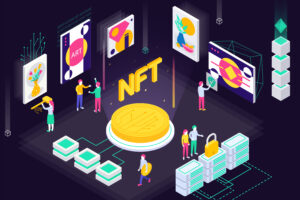
A recent entrant, iTrustCapital, provides free guidelines.
There’s no doubt cryptocurrency is beginning to look a bit like “kryptonite” when it comes to the IRS. For a number of years, digital currency was a bit of the Wild, Wild West in that most transactions happened outside the U.S. and beyond the purview of the Internal Revenue Service.
But no more. For several years, the IRS has sent strong warnings about the need to report the revenue from crypto trades on your U.S. tax turns. But managing these records is no easy feat. Simply ignoring the IRS on cryptocurrency trades is no longer an option as the agency has cracked down hard on offenders. So what do you do to ensure your reporting is accurate, and to be sure your participation in crypto isn’t causing you more in fees and taxes than the gains you may be getting are worth?
Thankfully, several software options have emerged to make virtual currency investments easier by managing and ensuring accurate reporting to the IRS.
But another option quickly gaining popularity is perhaps the easiest alternative of all: making cryptocurrency investments within a self-directed IRA.
While it’s technically feasible to use a standard self-directed IRA to invest in whatever you wish, but creating a fund specifically geared for the characteristics of digital currency is the best of all worlds – an investment vehicle that mirrors the best of what has been happening in the traditional financial markets for years. By setting up an IRA that is specifically designed for cryptocurrency purchase and sales, you can invest in any cryptocurrency you wish, or in multiple, but as long as the funds stay inside of the IRA, no taxes are owed.
The central location (and the provider you choose) can help you be certain your taxes are property reported when the day for withdrawals eventually comes. Also, just like the traditional financial markets, having the funds reside in an IRA helps to keep your head in the right space of discipline when it comes to viewing and holding your investments as long term vehicles as opposed to feeling the need to “churn” your account and jump to new investment choices upon each piece of news, thereby losing an undue portion of your digital currency earnings to ongoing capital gains taxes.
One of the early and leading providers in this relatively new space is iTrustCapital, a proprietary online trading platform with a focus on educating investors throughout the investing process, along with providing them with the benefits of trading cryptocurrency within an IRA. This can be an exciting way to move forward on benefits such as the chance to jump in early on high growth offerings, as well as the obvious benefit of postponing, or even eliminating, tax obligations until the eventual point after retirement age the funds are withdrawn.
“We are regularly amazed at the number of people who are unaware of the benefits of IRAs,” said CEO Todd Southwick. “It’s not just those in their 20’s and 30’s but across all age groups when it comes to the lack of knowledge of the incredible tax benefits offered by investing through IRAs.”
“Our mission is to not only help those with existing retirement accounts but to educate the many thousands of people who don’t yet have retirement accounts about the tax-deferred and tax-free benefits of IRAs.”
For starters, Southwick points to the following four questions as important background to research carefully before moving your cryptocurrency into a self-directed IRA from iTrustCapital or elsewhere.
The Four Red Flags – proceed with caution:
- Is all pricing and fee information posted upfront? In the case of iTrust all information is posted on the website and easy to find.
- Is the representative you are working with a commissioned salesperson?
- To find out, ask them directly and also read their client agreement, Southwick says. If the individual is not a licensed Financial Advisor are they giving you financial advice? According to regulatory requirements, they should not dispense this advice without having a proper certification and license for this.
- Did you find them on TV or through a high-profile spokesperson? Bear in mind that it is very expensive for an agent to advertise this way. Be sure it isn’t you who is bearing the cost of these fees.
- How liquid is the investment – Can you buy/sell 24/7?
- Do you have to speak to someone to do so?
- What is the settlement time?
In all, self-directed IRAs may be one of the best advances to emerge in the cryptocurrency space. But before you move your assets over, be sure to investigate the organizations you are considering as the IRA with care.















